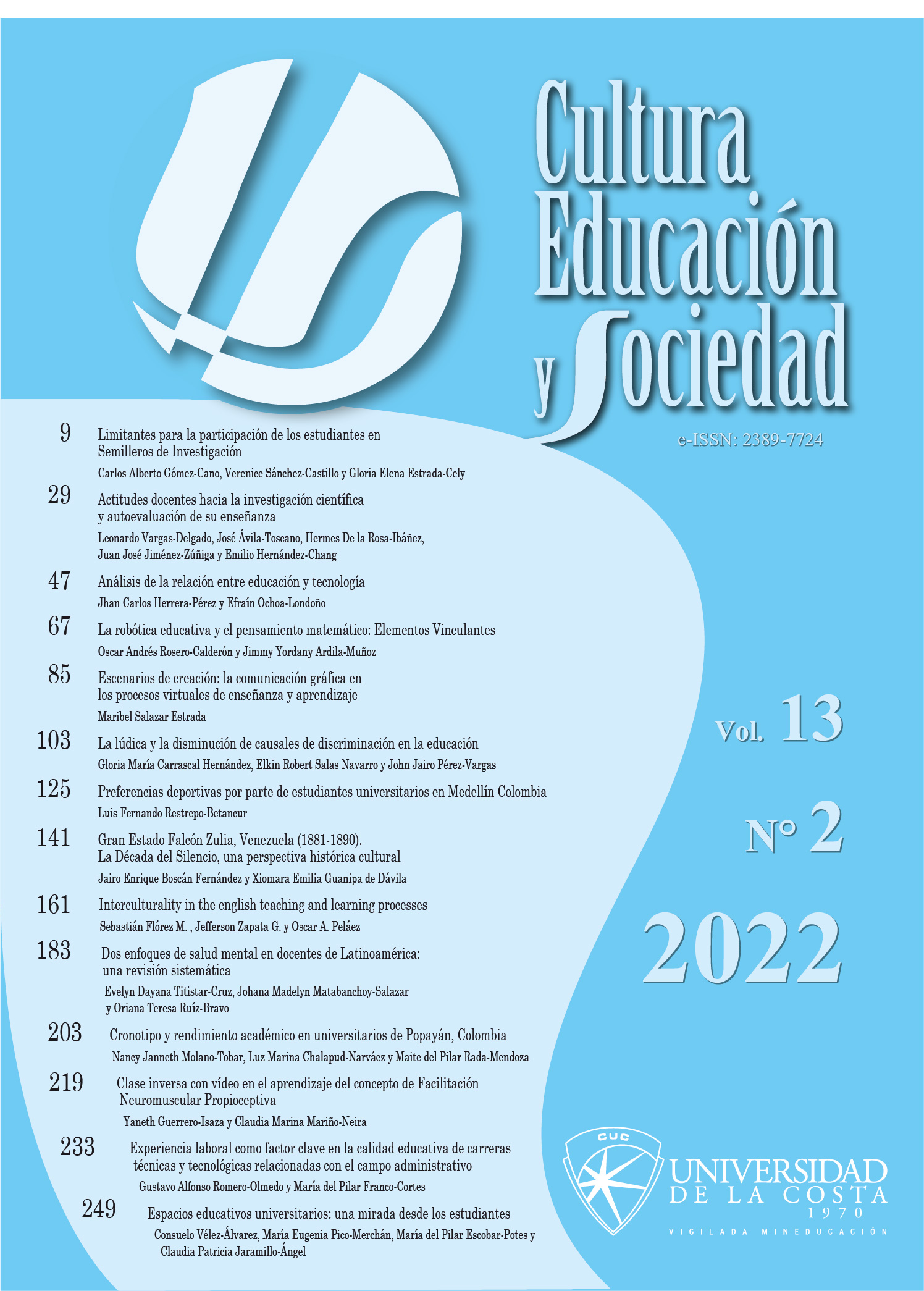Great Falcón Zulia State, Venezuela (1881-1890): The Decade of Silence a cultural historical perspective
DOI:
https://doi.org/10.17981/cultedusoc.13.2.2022.08Keywords:
Great Falcón-Zulia State, Regional autonomy, Public opinion, Antonio Guzmán BlancoAbstract
Introduction: At the end of the 19th century, the loss and subsequent recovery of the autonomy of the Zulia state (Venezuela), generated a debate between centralists and autonomics worthy of historiographical analysis Objective: To interpret the historical-cultural process that occurred in western Venezuela during the period 1881-1890, with the creation of the Falcón-Zulia State by President Antonio Guzmán Blanco; The circumstances that justify the passivity of Zulians in the face of a decision that ran over their regional autonomy are recognized. Methodology: Represents a documentary research, based on the review of primary sources corresponding to the Zulia State Historical Archive, and secondary references that clarify the thinking of the literate and economically privileged men of the 19th century. Results and discussion: Initially the Zulians passively tolerated the integrationist measure, however, 9 years later a movement for the recovery of the lost autonomy was promoted, materializing in 1890 the formal decision to return Zulia to its status as a sovereign state. This belated reaction corresponds to the respect that the marabina leadership expressed towards the figure of Guzmán Blanco for his condition as guarantor leader of political stability and national commercial development; in contrast to the characteristics of the caudillos who succeed him in the central power, who begin to interfere with what had been in the 1880s an autonomous process in relation to regional commercial development. Conclusions: The regional history chapter analyzed and the resolution of the proposed conflict meant the reaffirmation of the exacerbated regionalism that identifies the people of Zulia.
Downloads
References
Alvirde, V. (2021). Posibilidad de las ciencias del espíritu por medio de la filosofía hermenéutica de Dilthey. [Tesis licenciatura, Universidad Autónoma de México]. RI UAEM. http://hdl.handle.net/20.500.11799/111023
AHZ. (1890). Documento presentado ante el Congreso de los Estados Unidos de Venezuela en Febrero de 1890. Junta Reivindicadora de la Autonomía del Zulia.
Artigas, Y. (2008). La reforma territorial de 1881 y la reducción de los estados en Venezuela. Geoenseñanza, 13(2), 175–184. http://www.saber.ula.ve/handle/123456789/28945
Banko, C. (2021). La economía de Maracaibo: tiempos históricos contrastantes. Notas sobre la Economía Venezolana, (8). https://www.ucab.edu.ve/wp-content/uploads/2021/11/8Nota-Maracaibo_CB_12jul2021.pdf
Bermúdez, N. (2001). Vivir en Maracaibo en el siglo XIX. Acervo Histórico del Estado Zulia.
Bessòn, J. (1973). Historia del Estado Zulia (Tomo II). Ediciones del Banco Hipotecario del Zulia.
Boscán, J. (2018). Patrimonio Histórico de Paraguaná: Herramienta de Saber y Empoderamiento desde la Microcultura de sus Exponentes. [Tesis doctoral]. Universidad Nacional Experimental “Rafael María Baralt”.
Cardozo, G. (1991). Maracaibo y su región histórica. El Circuito Agroexportador 1830-1860. Universidad del Zulia.
Cardozo, G. y Quevedo, Y. (1997). Maracaibo: entre la tradición y la modernidad (Siglo XIX). Revista Frónesis, 4(2), 9–49. https://produccioncientificaluz.org/index.php/fronesis/article/view/16382
Carrera, G. (1980). Una nación Llamada Venezuela. Editorial de la UCV.
Dilthey, W. (1949). Introducción a las ciencias del espíritu. Fondo de Cultura Económica.
Foucault, M. (1997). Nietzsche, la genealogía, la historia. Ed. Pre-textos.
Fuenmayor, W. (2005). Atlas Estado Zulia: Síntesis Socio Histórico y Cultural. Planos Editorial.
Izard, M. (1976). Política y Economía en Venezuela. 1810-1976. Fundación John Boulton.
Lucia, J. S. (2022). Cuando la Fe interpreta y Transforma. Universidad Iberoamericana. AC.
Ortega, R. y Cardozo, G. (1979). Proyecto para la Creación del Centro de Estudios Históricos de la Facultad de Humanidades y Educación de LUZ. Centro de Estudios Historicos-CEH. http://www.luz.edu.ve/
Palmar, P. y Urdaneta, A. (2014). “El maridaje inconsulto” o pacto de unión de los Estados Zulia y Falcón durante el guzmanato (1881-1890). Cambios Y Permanencias, (5), 288–306. https://revistas.uis.edu.co/index.php/revistacyp/article/view/7182
Rangel, D, A. (1974). Los Andinos al Poder. Editorial de la UCV.
Silva, H. (2014). Administración político territorial y defensas de la autonomía en el Zulia (1881- 1890). Presente y Pasado. Revista de Historia, 19(37), 85–114. http://erevistas.saber.ula.ve/index.php/presenteypasado/article/view/14047
Urdaneta, A. (1992). El Zulia en el Septenio de Guzmán Blanco. Editorial de LUZ.
Vásquez, B. (1985). Maracaibo y su Espacio Histórico (Siglo XVIII). Tierra Firme. Revista de Historia y Ciencias Sociales, (10), 215–236. http://tierrafirmerevista.blogspot.com/
Published
How to Cite
Issue
Section
License
Copyright (c) 2022 CULTURA EDUCACIÓN Y SOCIEDAD

This work is licensed under a Creative Commons Attribution-NonCommercial-NoDerivatives 4.0 International License.
![]()
Creative Commons 2020 CULTURA EDUCACIÓN Y SOCIEDAD
This article is under international license Creative Commons Reconocimiento-NoComercial-SinObrasDerivadas 4.0.
The published articles are the sole responsibility of their authors and do not necessarily reflect the opinions of the editorial committee.
CULTURA EDUCACIÓN Y SOCIEDAD respects the moral rights of its authors, who assign to the editorial committee the patrimonial rights of the published material. In turn, the authors inform that this work is unpublished and has not been previously published.
All articles are under a:
Licencia Creative Commons Atribución-NoComercial-SinDerivadas 4.0 Internacional.
![]()


 English
English
 Español (España)
Español (España)




_12.53_.27_p_. m_._3.png)





_12.57_.35_p_. m_._3.png)
_12.50_.37_p_. m_._3.png)



